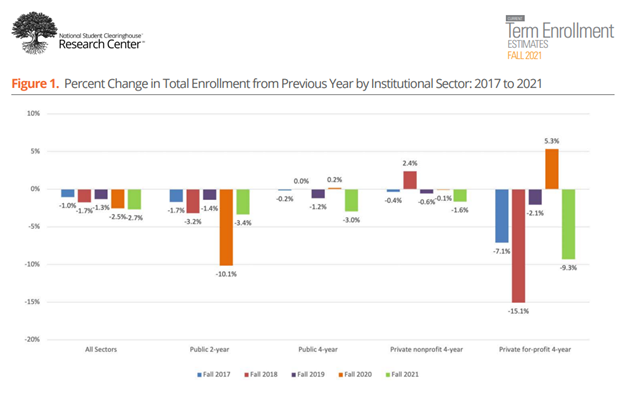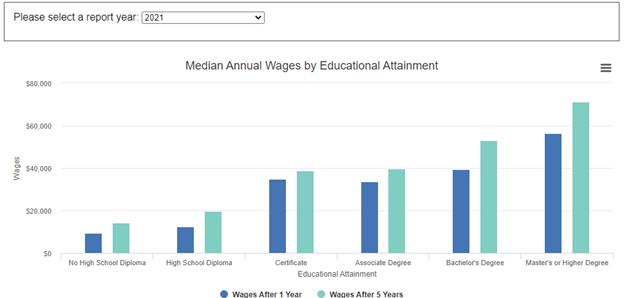Gov. Gretchen Whitmer, who in her inaugural address in 2019 included a commitment to ensuring “everyone in the state has the education and skills needed to compete for good-paying jobs,” urged the state to raise its rate of working-age adults with a certificate or college degree from 44 percent to 60 percent by the year 2030. Michigan currently ranks 37th nationally for education attainment and will need 700,000 more credentialed workers by 2030; 500,000 of them will need a 2- or 4-year degree.
Nationwide, higher education enrollment fell a further 2.7 percent in the fall of 2021 following a 2.5 percent drop in the preceding year. Continued enrollment losses resulting from the pandemic represent a total two-year decline of 5.1 percent, or 938,000 students, since the fall of 2019. Michigan college officials had hoped this decline was a one-year dip due to COVID, but early indications are that enrollment among low income students may continue to decline. The reasons for the drop in college-going have been widely discussed – the pandemic, declining birth rates, the widespread immediate availability of jobs, greater public skepticism of the need and cost of postsecondary education – but the long-term effects it will have on the economy have gotten less attention.

And yet, it is indisputable that postsecondary education is critical to the future workforce and our state’s economy. As businesses move toward automation and AI, the way to avoid displaced workers in the process is to produce more highly skilled workers who have certificates and degrees to fill the occupations of the future. Additionally, those without education past high school earn significantly less than their peers with postsecondary education. The median wage for Michigan workers one year after they receive a high school diploma is $12,400, which rises to $19,800 after five years, according to MI School Data. Paychecks improve dramatically for college graduates. The median income for someone with a two-year associates degree is $33,700 after one year and $39,600 after five years. For someone with a four-year bachelor’s degree, it rises from $39,300 to $52,900.
Median Annual Wages by Education Attainment – MIschooldata.org

Talent 2025, along with West Michigan’s college presidents, has identified postsecondary enrollment, persistence, and completion as a priority to make West Michigan a top 20 employment region. To ensure all Michigan students enroll and complete their postsecondary education, there must be a greater awareness among parents and students regarding the value of a college education and the importance of education after high school for the future of work. As a result, DiscoverEducation@Work was developed.
DiscoverEducation@Work is a collaborative initiative between West Michigan businesses and local college experts to promote the value of postsecondary education to parents and potential adult learners through informational presentations delivered right at the workplace.
What we often hear is a negative perception on pursuing postsecondary opportunities. Many adults in the community have succeeded in their career pathways without having completed certificates or degrees and this viewpoint continues to be projected onto their children. Some parents also question the return on investment in postsecondary education for their children or find the process of applying for college and financial aid to be too complex. DiscoverEducation@Work aims to demystify these viewpoints.
While Michigan postsecondary institutions and secondary schools have often tried to reach parents through college access programming at their local school districts, this does not capture the entire parent market. Many parents work shift work or lack transportation or childcare which does not allow them to be present during proposed workshop hours. DiscoverEducation@Work increases access to information about postsecondary education, the financial aid process, and the tools and resources for next steps by delivering information to parents at their workplaces.
DiscoverEducation@Work is a talent development strategy businesses can leverage to show their employees the importance of postsecondary education and how they can access financial resources to develop the 21st century skills businesses need. We owe every Michigander the opportunity to access the education and skills they need to secure better jobs and bigger paychecks. Together, we can build a better Michigan for all.
To learn more about hosting a DiscoverEducation@Work presentation at your workplace, contact Lisa Hungerford, Director of Education Innovation for Talent 2025. L.hungerford@talent2025.org


